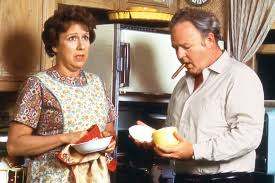
Few television shows in history have achieved the cultural impact of All in the Family. But while audiences laughed, cried, and learned alongside the Bunker family, behind the scenes, the show’s beloved “Edith Bunker,” played by Jean Stapleton, was facing a very different script — one filled with pressure, power struggles, and whispered betrayals.
For decades, fans were told that Jean Stapleton left the show on her own terms, yearning to explore new creative horizons. But now, after years of speculation, industry insiders are speaking out — and what they’re saying might forever change how we remember America’s favorite TV mom.
The Face of Warmth—and of Trouble?
Jean Stapleton was more than just a supporting actress on All in the Family — she was the heart of the show. As Edith Bunker, her sweet, naive demeanor served as the perfect foil to Carroll O’Connor’s brash and bigoted Archie. Fans adored her, critics praised her, and the ratings? Sky high.
But according to newly resurfaced interviews and leaked network memos, her departure in 1979 wasn’t as rosy as the official narrative claimed.
“She said she wanted to move on,” said a former CBS executive who spoke under the condition of anonymity. “But there were a lot of voices in the room—some of them were definitely pushing her out.”
A Career at a Crossroads
By the late 1970s, Jean Stapleton was ready to evolve. She had been offered roles on Broadway, film scripts were stacking up on her desk, and there was a growing sentiment in Hollywood that her talents were being underutilized.
In public, she spoke about wanting to avoid being typecast. “I didn’t want to play Edith forever,” she once said in a 1981 interview. “I loved her, but I had to grow.”
But behind the scenes, Stapleton’s relationship with co-star Carroll O’Connor and showrunner Norman Lear had grown strained. According to reports, O’Connor—who had his own share of power struggles with Lear—was unhappy with changes to his character’s dynamic. Some say that he saw Stapleton’s potential exit as an opportunity to reshape the show around Archie.
Carroll O’Connor: Co-Star or Co-Conspirator?
Rumors swirled in the late ’70s that O’Connor and Stapleton weren’t as chummy off-screen as they were on-camera. In fact, sources now claim that O’Connor pushed for changes to the cast lineup to give Archie more dramatic range.
“He was the star, and he wanted to be the star,” said a longtime crew member. “Edith was beloved, but Archie’s character was evolving. Jean was seen as too ‘soft’ for the darker themes the writers wanted to tackle.”
In what many now interpret as a calculated move, network execs may have used this shifting tone to encourage Stapleton to reconsider her place in the show.
Norman Lear’s Tightrope Walk
Norman Lear, the visionary creator behind All in the Family, has always taken the high road when it came to Jean Stapleton’s departure. But Lear’s past interviews contain a few telling moments.
“She felt she had done everything she could with Edith,” Lear said in a 1999 PBS documentary. “I respected that.”
Yet Lear has also hinted that network interference was a constant concern. “CBS was always breathing down our necks,” he said in another interview. “They wanted things faster, cheaper, and more explosive.”
Was Edith Bunker—gentle, slow-talking, and moral—a casualty of a changing industry desperate for flash and fire?
A Final Episode Full of Clues
When Edith Bunker was killed off in the follow-up series Archie Bunker’s Place, fans were devastated. The show chose not to show her death, only referencing that she had passed away from a stroke off-screen. Critics called it “cold,” “unjust,” and “deeply unsatisfying” for a character who had carried so much emotional weight.
Even Stapleton, in later years, seemed to regret how it ended. “It felt abrupt,” she told a fan magazine in 1985. “But by that point, the decisions weren’t mine.”
This vague phrasing fueled even more speculation. Was she told to make the choice—or did she really want to leave?
What the Documents Reveal
Recently uncovered documents and internal CBS memos from the late ’70s show that discussions about “restructuring the cast” were happening months before Stapleton announced her departure.
In one memo dated June 1978, a CBS executive wrote:
“Stapleton may be hesitant to extend beyond current contract. Recommend exploring creative solutions or encouraging early exit.”
If that doesn’t sound like code for corporate nudging, what does?
The Legacy of Edith—and of Jean
Despite the controversy, Stapleton’s legacy remains untarnished in the eyes of fans. She went on to perform in theater, television movies, and guest appearances, always radiating the same warmth that made Edith iconic.
Yet the question lingers: was her decision truly hers, or was it part of a larger power play?
Fans React Years Later
Even today, fan forums and Reddit threads debate what really happened.
User @TVNostalgiaQueen writes:
“They wrote her off like she was nothing. It felt like a betrayal—not just to her but to us, the fans.”
Another user counters:
“She said she wanted to go. Let’s respect that. Maybe it was just time.”
But others suspect foul play, especially given the abrupt nature of her exit and the coldness of her character’s off-screen death.
Conclusion: The Truth Lies Somewhere in Between
Jean Stapleton’s departure from All in the Family is more than just a moment in TV history — it’s a case study in the power struggles that define show business. Whether it was truly her choice, a result of internal politics, or a bit of both, the way her exit was handled remains one of television’s most debated moments.
The only thing we know for certain? Edith Bunker deserved better. And maybe—just maybe—so did Jean Stapleton.
What do you think? Was Jean Stapleton pushed out, or did she leave on her own terms? Share your thoughts with us below. 👇
